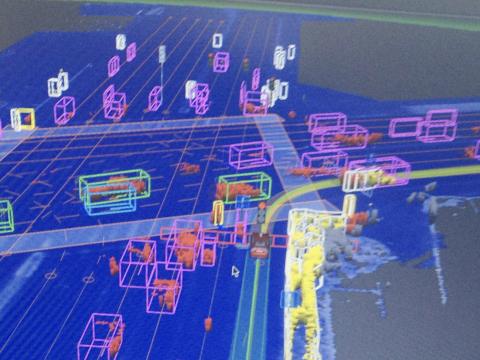Google Inc’s self-driven cars will soon be appearing on Nevada roads after the state’s Department of Motor Vehicles (DMV) approved on Monday the nation’s first autonomous vehicle license.
The move came after officials rode along on drives on highways, in Carson City neighborhoods and along the Las Vegas Strip, the Nevada DMV said in a statement.
The Nevada legislature last year authorized self-driven cars for the state’s roads, the first such law in the US. That law went into effect on March 1.

Photo: Reuters
Google’s self-driven cars rely on video cameras, radar sensors, lasers and a database of information collected from manually driven cars to help navigate, according to the company.
The DMV licensed a Toyota Prius that Google modified with its experimental driverless technology, developed by Stanford professor and Google vice president Sebastian Thrun.
Google’s self-driving cars have crossed the Golden Gate Bridge and driven along the picturesque Pacific Coast Highway, according to the company.
Autonomous vehicles are the “car of the future,” Nevada DMV director Bruce Breslow said in a statement. The state also has plans to eventually license autonomous vehicles owned by the members of the public, the DMV said.
Legislation to regulate autonomous cars is being considered in other states, including Google’s home state of California.
“The vast majority of vehicle accidents are due to human error. Through the use of computers, sensors and other systems, an autonomous vehicle is capable of analyzing the driving environment more quickly and operating the vehicle more safely,” California state Senator Alex Padilla said in March when he introduced that state’s autonomous car legislation.
Other car companies are also seeking self-driven car licenses in Nevada, the DMV said.
Separately, Toyota Motor Corp unveiled on Monday what it says is the first all-electric sports utility vehicle (SUV) on the market, a version of its popular RAV4 with a top range of 161km and minimum six-hour charge time.
The car will be sold initially only in California with a base price of US$49,800 and the Japanese car company hopes to sell a relatively modest 2,600 units over the next three years.
Toyota Motor Sales USA executive Bob Carter said the company believes the car would “attract sophisticated early technology adopters, much like the first-generation Prius,” Toyota’s pioneering hybrid car launched 15 years ago.
“It’s all about blending the best of two worlds ... The all-new RAV4 EV marries the efficiency of an EV with the versatility of a small SUV — in fact, it is the only all-electric SUV on the market,” he added.
The car, which costs more than twice as much as the gas version of the RAV4 and would have difficulties with out-of-town driving for any distance, may struggle to find a mass appeal.
“It’s designed for consumers who prioritize the environment and appreciate performance,” Carter said, adding that the new car would go on sale later this summer in San Francisco, Los Angeles, Orange County and San Diego.
“We look forward to seeing how the market responds,” he added, unveiling the car at the 26th annual Electric Vehicle Symposium in Los Angeles.

SEEKING CLARITY: Washington should not adopt measures that create uncertainties for ‘existing semiconductor investments,’ TSMC said referring to its US$165 billion in the US Taiwan Semiconductor Manufacturing Co (TSMC, 台積電) told the US that any future tariffs on Taiwanese semiconductors could reduce demand for chips and derail its pledge to increase its investment in Arizona. “New import restrictions could jeopardize current US leadership in the competitive technology industry and create uncertainties for many committed semiconductor capital projects in the US, including TSMC Arizona’s significant investment plan in Phoenix,” the chipmaker wrote in a letter to the US Department of Commerce. TSMC issued the warning in response to a solicitation for comments by the department on a possible tariff on semiconductor imports by US President Donald Trump’s

The government has launched a three-pronged strategy to attract local and international talent, aiming to position Taiwan as a new global hub following Nvidia Corp’s announcement that it has chosen Taipei as the site of its Taiwan headquarters. Nvidia cofounder and CEO Jensen Huang (黃仁勳) on Monday last week announced during his keynote speech at the Computex trade show in Taipei that the Nvidia Constellation, the company’s planned Taiwan headquarters, would be located in the Beitou-Shilin Technology Park (北投士林科技園區) in Taipei. Huang’s decision to establish a base in Taiwan is “primarily due to Taiwan’s talent pool and its strength in the semiconductor

An earnings report from semiconductor giant and artificial intelligence (AI) bellwether Nvidia Corp takes center stage for Wall Street this week, as stocks hit a speed bump of worries over US federal deficits driving up Treasury yields. US equities pulled back last week after a torrid rally, as investors turned their attention to tax and spending legislation poised to swell the US government’s US$36 trillion in debt. Long-dated US Treasury yields rose amid the fiscal worries, with the 30-year yield topping 5 percent and hitting its highest level since late 2023. Stocks were dealt another blow on Friday when US President Donald

UNCERTAINTY: Investors remain worried that trade negotiations with Washington could go poorly, given Trump’s inconsistency on tariffs in his second term, experts said The consumer confidence index this month fell for a ninth consecutive month to its lowest level in 13 months, as global trade uncertainties and tariff risks cloud Taiwan’s economic outlook, a survey released yesterday by National Central University found. The biggest decline came from the timing for stock investments, which plunged 11.82 points to 26.82, underscoring bleak investor confidence, it said. “Although the TAIEX reclaimed the 21,000-point mark after the US and China agreed to bury the hatchet for 90 days, investors remain worried that the situation would turn sour later,” said Dachrahn Wu (吳大任), director of the university’s Research Center for